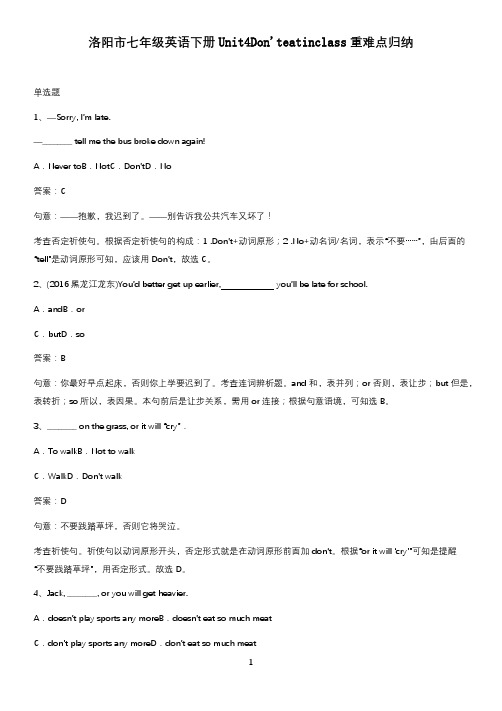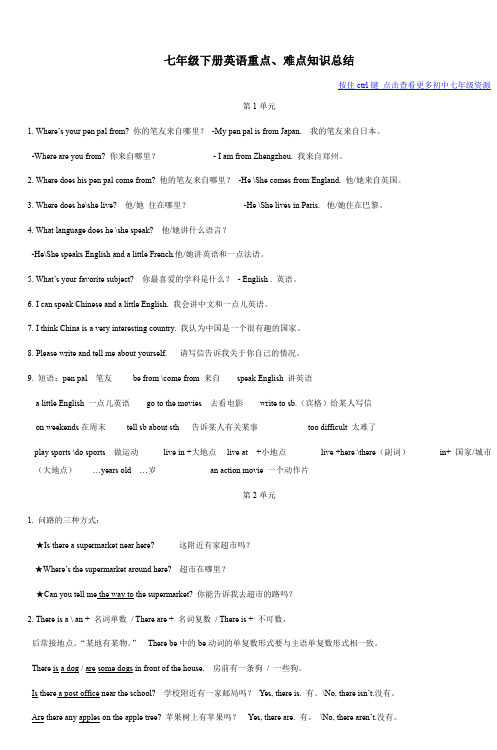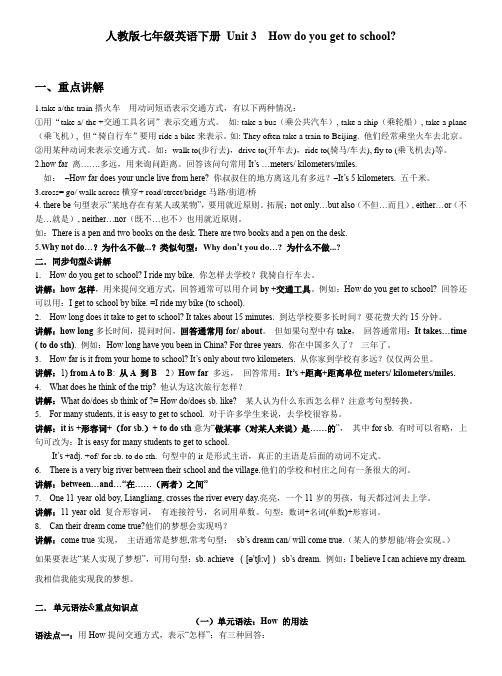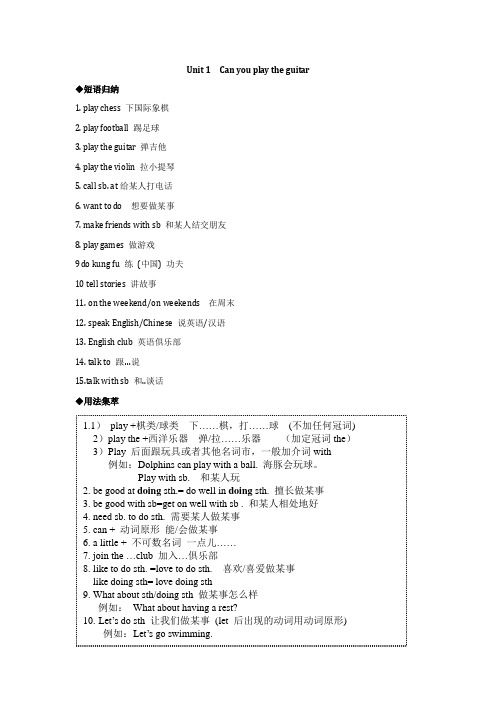七年级英语下册重难点
新目标七年级英语(下册)重点难点考点精讲及练习,高分突破

七年级英语重点难点精细讲解及练习(下册)Unit 1 ~ 4[考点聚焦]I. 词组归纳1. 在邮局和电子游戏中心之间_________,2. 在公用电话对面____________3. 带我的狗去散步_________________ ,4. 打的去…… _________________5. 玩得高兴_________________ ,6. 在附近_________________7. 直走_________________ ,8. 向左转_________________9. 在图书馆的右边________________ ,10. 欢迎来到花园小区!____________ 11. 一幢有一个美丽花园的房子_________,12. ……的开始__________________ 13. 一个消遣的好地方_________________,14. 去我家的路__________________ 15. 有点儿,稍微___________________ ,16. 在晚上___________________ 17. 吃草和树叶__________________ ,18. 想要,愿意__________________ 19. 青椒___________________ ,20. 冰茶___________________21. 也,还,而且___________________ ,22. 比萨快递___________________ 23. 点一份比萨___________________ ,24. 看菜单____________________ 25. 售货员_________________ ,26. 警官_________________27. 银行职员_________________ ,28. 警察局_________________29. 出去,外出_________________ ,30. 想成为_________________31. 与……一起工作__________________ ,32. 把某物给某人_________________ 33. 从某人处得到某物______________ ,34. 穿一套白色的制服____________ 35. 与某人交谈__________________ ,36. 参加校园剧的演出_____________ 37. 有一份护士的工作给你_____________,38. 5~12岁的儿童______________ II. 句型归纳1. _______ _______ a supermarket? No, there isn’t.2. _______ the park? It’s _______ Center Street.3. _______ the hotel? It’s next _______ the bank.4. _______ _______ he like koala bears? Because they’re _______ of cute.5. _______ _______ ________ pizza would you like?I’d like a pepperoni pizza, please.6. _______ _______ pizza would she like? _______ likes a medium pizza.7. _______ would they like _______ their pizza?They’d like mushrooms, onions and olives.8. _______ _______ he do? He’s a reporter.9. _______ _______ he? He’s a doctor.10. _______ _______ she want to _______? A sales assistant.III. 考点归纳1. 关于问路及回答的常用语1) Excuse me, is there a ...?Excuse me, where is the ...?Excuse me, which is the way to the ...?Excuse me, can you tell me the way to the ...?Excuse me, can you tell me how to get to the ...?Excuse me, how can I get to the ...?2) Go/Walk straight (along the street).Go/Walk along/up/down the street.Go/Walk along/up/down the street to the end.Go/Walk along/up/down the street about ten minutes.Turn (to the) left/right.Turn left/right at the traffic lights.Turn left/right at the second turning.(= Take the second turning on the left/right.)2. There’s a bank on the Central Street. 在中心路有一个银行。
洛阳市七年级英语下册Unit4Don'teatinclass重难点归纳

洛阳市七年级英语下册Unit4Don'teatinclass重难点归纳单选题1、—Sorry, I’m late.—________ tell me the bus broke down again!A.Never toB.NotC.Don’tD.No答案:C句意:——抱歉,我迟到了。
——别告诉我公共汽车又坏了!考查否定祈使句。
根据否定祈使句的构成:1 .Don’t+动词原形;2 .No+动名词/名词,表示“不要……”,由后面的“tell”是动词原形可知,应该用Don’t,故选C。
2、(2016黑龙江龙东)You’d better get up earlier, you’ll be late for school.A.andB.orC.butD.so答案:B句意:你最好早点起床,否则你上学要迟到了。
考查连词辨析题。
and和,表并列;or否则,表让步;but但是,表转折;so所以,表因果。
本句前后是让步关系,需用or连接;根据句意语境,可知选B。
3、________ on the grass, or it will “cry”.A.To walkB.Not to walkC.WalkD.Don't walk答案:D句意:不要践踏草坪,否则它将哭泣。
考查祈使句。
祈使句以动词原形开头,否定形式就是在动词原形前面加don‘t。
根据“or it will ‘cry’”可知是提醒“不要践踏草坪”,用否定形式。
故选D。
4、Jack, ________, or you will get heavier.A.doesn’t play sports any moreB.doesn’t eat so much meatC.don’t play sports any moreD.don’t eat so much meat句意:Jack,不要吃太多肉,否则你会变得更胖的。
考查否定祈使句。
否定祈使句应以“don’t”开头,排除A和B,由空后的“or you will get heavier”可知,应该是“不要吃如此多的肉”,排除C,故选D。
人教版英语七年级下册unit9--12单元重难点复习

考向1:It is+adj.+for sb.+to do sth. 。如:It is easy for many students to get to school. 对很多学生来说,去上学是很容易的事 情。 [
考向2:It is+adj.+ of sb.+to do sth. 如:It’s wise of him to give up smoking.他戒 烟是明智的。
2. It was ____D____ yesterday. Unluckily, I left my umbrella in the office. A. foggy B. sunny C. windy D. rainy 3. ____C____ fine weather it is! I want to go to a park. A. How B. How a C. What D. What a 4. It will be __s_u_n_n_y__ (sun) tomorrow according to the weather forecast.
5. the, weather, what, like, was, last Sunday (连词成句)
W_h__a_t__w__a_s__t_h__e__w__e_a_t_h__e_r__l_i_k_e__l_a_s_t__S_u__n__d_a__y______?
以下四个词都有“花费”的意思,具体 区别体现在结构上,如下表:
太多的, too 后面跟不
I have too much homework this weekend.我这周末有很多
much 可数名词。 的作业
非常,太, It is much too cold on the top
七年级下册英语重点难点知识总结

七年级下册英语重点、难点知识总结按住ctrl键点击查看更多初中七年级资源第1单元1.Where’s your pen pal from?你的笔友来自哪里?-My pen pal is from Japan.我的笔友来自日本。
-Where are you from?你来自哪里?-I am from Zhengzhou.我来自郑州。
2.Where does his pen pal come from?他的笔友来自哪里?-He\She comes from England.他/她来自英国。
3.Where does he\she live?他/她住在哪里?-He\She lives in Paris.他/她住在巴黎。
4.What language does he\she speak?他/她讲什么语言?-He\She speaks English and a little French.他/她讲英语和一点法语。
5.What’s your favorite subject?你最喜爱的学科是什么?-English.英语。
6.I can speak Chinese and a little English.我会讲中文和一点儿英语。
7.I think China is a very interesting country.我认为中国是一个很有趣的国家。
8.Please write and tell me about yourself.请写信告诉我关于你自己的情况。
9.短语:pen pal笔友be from\come from来自speak English讲英语a little English一点儿英语go to the movies去看电影write to sb.(宾格)给某人写信on weekends在周末tell sb about sth告诉某人有关某事too difficult太难了play sports\do sports做运动live in+大地点live at+小地点live+here\there(副词)in+国家/城市(大地点)…years old…岁an action movie一个动作片第2单元1.问路的三种方式:★Is there a supermarket near here?这附近有家超市吗?★Where’s the supermarket around here?超市在哪里?★Can you tell me the way to the supermarket?你能告诉我去超市的路吗?2.There is a\an+名词单数/There are+名词复数/There is+不可数,后常接地点。
Unit3重难点讲解与练习人教版七年级英语下册

人教版七年级英语下册Unit 3 How do you get to school?一、重点讲解1.take a/the train搭火车用动词短语表示交通方式,有以下两种情况:①用“take a/ the +交通工具名词”表示交通方式。
如: take a bus(乘公共汽车), take a ship(乘轮船), take a plane (乘飞机), 但“骑自行车”要用ride a bike来表示。
如: They often take a train to Beijing. 他们经常乘坐火车去北京。
②用某种动词来表示交通方式。
如:walk to(步行去),drive to(开车去),ride to(骑马/车去), fly to (乘飞机去)等。
2.how far 离…….多远,用来询问距离。
回答该问句常用It’s …meters/ kilometers/miles.如:–How far does your uncle live from here? 你叔叔住的地方离这儿有多远?–It’s 5 kilometers. 五千米。
3.cross= go/ walk across横穿+ road/street/bridge马路/街道/桥4. there be句型表示“某地存在有某人或某物”,要用就近原则。
拓展:not only…but also(不但…而且), either…or(不是…就是), neither…nor(既不…也不)也用就近原则。
如:There is a pen and two books on the desk. There are two books and a pen on the desk.5.W hy not do…?为什么不做...?类似句型:Why don’t you do…? 为什么不做...?二.同步句型&讲解1.How do you get to school? I ride my bike. 你怎样去学校?我骑自行车去。
人教版英语七年级下册 Unit 1 ---unit3重难点 归纳

Unit 1 Can you play the guitar◆短语归纳1. play chess 下国际象棋2. play football 踢足球3. play the guitar 弹吉他4. play the violin 拉小提琴5. call sb. at给某人打电话6. want to do 想要做某事7. make friends with sb 和某人结交朋友8. play games 做游戏9 d o kung fu 练(中国) 功夫10 tell stories 讲故事11. on the weekend/on weekends 在周末12. speak English/Chinese 说英语/汉语13. English club 英语俱乐部14. talk to 跟…说15.talk with sb 和..谈话◆用法集萃1.1)play +棋类/球类下……棋,打……球(不加任何冠词)2)play the +西洋乐器弹/拉……乐器(加定冠词the)3)Play 后面跟玩具或者其他名词市,一般加介词with 例如:Dolphins can play with a ball. 海豚会玩球。
Play with sb. 和某人玩2. be good at doing sth.= do well in doing sth. 擅长做某事3. be good with sb=get on well with sb . 和某人相处地好4. need sb. to do sth. 需要某人做某事5. can + 动词原形能/会做某事6. a little + 不可数名词一点儿……7. join the …club 加入…俱乐部8. like to do sth. =love to do sth. 喜欢/喜爱做某事like doing sth= love doing sth9. What about sth/doing sth 做某事怎么样例如:What about having a rest?10.Let’s do sth 让我们做某事(let 后出现的动词用动词原形)例如:Let’s go swimming.◆重难点注释一.Can 的用法1. 表示能力She can sing that song in English. 她能用英文唱那首歌。
七年级英语Go for it!下册句型和短语、重难点总结
七年级下册英语重点、难点知识总结:第1单元1. Where’s your pen pal from? 你的笔友来自哪里?-My pen pal is from Japan. 我的笔友来自日本。
-Where are you from? 你来自哪里?- I am from Zhengzhou. 我来自郑州。
2. Where does his pen pal come from? 他的笔友来自哪里?-He \She comes from England. 他/她来自英国。
3. Where does he\she live? 他/她住在哪里?-He \She lives in Paris. 他/她住在巴黎。
4. What language does he \she speak? 他/她讲什么语言?-He\She speaks English and a little French.他/她讲英语和一点法语。
5. What’s your favorite subject? 你最喜爱的学科是什么?- English . 英语。
6. I can speak Chinese and a little English. 我会讲中文和一点儿英语。
7. I think China is a very interesting country.我认为中国是一个很有趣的国家。
8. Please write and tell me about yourself.请写信告诉我关于你自己的情况。
9. 短语:pen pal 笔友be from \come from 来自speak English 讲英语 a little English 一点儿英语go to the movies 去看电影write to sb.(宾格)给某人写信on weekends在周末tell sb about sth 告诉某人有关某事too difficult 太难了play sports \do sports 做运动live in +大地点live at +小地点live +here \there(副词)in+ 国家/城市(大地点)…years old …岁an action movie 一个动作片第2单元1. 问路的三种方式:★Is there a supermarket near here? 这附近有家超市吗?★Where’s the supermarket around here? 超市在哪里?★Can you tell me the way to the supermarket?你能告诉我去超市的路吗?2. There is a \ an + 名词单数/ There are + 名词复数/There is + 不可数,后常接地点。
仁爱版英语七年级下册unit7重难点知识归纳总结
仁爱版英语七年级下册Unit 7 The Birthday Party Topic 1 When is your birthday?【重点单词】1.writer [ˈraɪtɚ] n. 作家,作者2.novel [ˈnɒvl] n. (长篇)小说3.was [wɒz] v. (am, is的过去式)是4.born [bɔ:n] v. 出生5.fan [fæn] n. 迷;风扇6.March [mɑ:tʃ] n. (mar.)三月7.April ['eɪprəl] n. (apr.)四月8.May [meɪ] n. 五月9.June [dʒu:n] n. (jun.)六月10.August [ˈɔ:gəst] n. (aug.)八月11.September [sepˈtembə(r)] n. (sept.)九月12.October [ɒkˈtəʊbə(r)] n. (oct.)十月13.November [nəʊˈvembə(r)] n. (nov.)十一月14.December [dɪˈsembə(r)] n. (dec.)十二月15.January [ˈdʒænjuəri] n. (jan.)一月16.were [wɜ:(r)] v. (are的过去式)是17.thousand [ˈθaʊznd] num. 千18.birthday [ˈbɜ:θdeɪ] n. 生日19.date [deɪt] n. 日期;约会20.calendar [ˈkælɪndə(r)] n. 日历21.plan [plæn] v. &n. 计划,打算22.celebrate ['selɪbreɪt] v. 庆祝23.party ['pɑ:tɪ] n. 聚会,宴会;党派24.fourth [fɔ:θ] num. 第四25.fifth [fɪfθ] num. 第五26.sixth [sɪksθ] num. 第六27.seventh ['sevnθ] num. 第七28.eighth [eɪtθ] num. 第八29.ninth [naɪnθ] num. 第九30.tenth [tenθ] num. 第十31.eleventh [ɪ'levnθ] num. 第十一32.twelfth [twelfθ] num. 第十二33.twentieth ['twentɪəθ] num. 第二十34.present ['preznt] n. 礼物35.shape [ʃeɪp] n. 形状v. 使成为……形状36.ball [bɔ:l] n. 球;舞会37.afraid [əˈfreɪd] adj. 担心;害怕38.star [stɑ:(r)] n. 星;明星39.mouse [maʊs] n. 老鼠40.square [skweə(r)] n. 正方形;广场;平方adj. 正方形的41.circle ['sɜ:kl] n. 圈,圆圈v. 圈出42.triangle ['traɪæŋɡl] n. 三角形43.rectangle [ˈrektæŋgl] n. 长方形;矩形44.oval ['əʊvl] n. 椭圆adj. 椭圆形的45.centimeter ['sentɪˌmi:tə] n. (cm)厘米46.Mrs. [ˈmɪsɪz] n. 太太,夫人47.cake [keɪk] n. 蛋糕【重点短语】1.be born 出生2.look at 看3.plan to do sth. 计划做某事4.have a birthday party 举办生日聚会5.the shape of ……的形状6.be like 像……7.how long 多长8.how wide 多宽e ... for ... 用……做……【重点句型】1.—When were you / was he/she born?你/他/她是什么时候出生的?—I/He/She was born on/in …我/他/她出生于……2.—Where were you / was he/she born?你/他/她在哪里出生的?—I/He/She was born in …我/他/她出生在……3.—When is your birthday?你的生日是什么时候?—May 13th.5月13号。
七年级下册英语人教版全册每单元学习目标和重难点
Unit 1Can you play the guitar?【学习目标】1. 掌握表示爱好的单词.2.熟练的谈论表示能力的话题,以及自己的意愿.【学习重点】1.情态动词can小结:后面总是接动词原形,没有人称和数的变化。
意思是“能,会”。
用法口诀:情态can表能力,和行为动词不分离。
不管主语如何变,can的模样永不变。
只要出现动词can,动词原形后面站。
一般疑问can提前,否定can后not添。
2. play的用法小结:play与体育、棋类词语连用时,不加定冠词theeg: play basketball, play chess, play cardsplay与乐器类词语连用时要加定冠词theeg: play the guitar,play the piano play the drum,play the violinUnit 2 What time do you go to school?【学习目标】:1.能够利用所学句型询问及表述时间。
2.掌握时间表达法3.进一步掌握what time和when引导的疑问句4.掌握usually, always never, on weekends 等词的用法。
Unit 3 How do you get to school?【学习目标】【学习重点】:1.学习单词和短语sixty ,seventy, eighty, ninety, hundred,minute , kilometer, new, every day, by bike.2.句型:How long does it take? How far is it ?3、学习how对交通方式提问的特殊疑问句。
4、谈论如何到达某地;学会用how 来问路;5、并学会谈论自己或他人的健康生活方式。
Unit 4 Don’t eat in class.【学习目标】【学习重点】:1、巩固祈使句的用法;2、学习情态动词can表示许可的肯定句、否定句、一般疑问句及肯定、否定回答。
七年级英语下册:Unit 10 Where did you go on vacation重难点解析(
Unit 10 Where did you go on vacation?一、教学内容:Unit 10 Where did you go on vacation?【具体教学内容】(一)语言功能:Talk about past events 谈论过去的事情(二)目标语言:1. Where did you/she/they go on vacation?I/ She/They went to summer camp.2. Did you/he/ she go to Central Park?Yes, I /he /she/they did.No, I/ he /she / they didn’t.(三)重点单词和词组1. summer camp 夏令营winter camp 冬令营2. friend 朋友friendly 友好的unfriendly 不友好的clear 清楚的unclear 不清楚的wele 受欢迎的unwele不受欢迎的real 真实的unreal 不真实的3. expensive 昂贵的(同)dear (反)cheapIt’s too expensive. I can’t buy it. 它太贵了,我买不起。
Are the books expensive or cheap? 这些书贵还是便宜?4. corner 角落,墙角in the corner 拐弯处的内角at the corner 拐弯处的外角He is standing in the corner. 他站在拐弯处。
5. decide v. 决定(1) decide + 名词或代词They can’t decide anything now.(2) decide to do We decide to help him.(3) decide+ wh- + to do She can’t decide where to go?练一练Her father decided ______ her himself.A. teachB. to teachC. teachingD. taught6. discuss v. 讨论(1) discuss sth. I want to discuss the problem with you.(2) discuss + wh- We are discussing when to start.7. back adv. 回原处,往回去go back 回去 e back 回来n. 背部,后面,后部in/ at the back of…在……后面at the back of the house(反) in front of / in the front of8. the Great Wall 长城He who does not reach the Great Wall is not a true man.不到长城非好汉。
- 1、下载文档前请自行甄别文档内容的完整性,平台不提供额外的编辑、内容补充、找答案等附加服务。
- 2、"仅部分预览"的文档,不可在线预览部分如存在完整性等问题,可反馈申请退款(可完整预览的文档不适用该条件!)。
- 3、如文档侵犯您的权益,请联系客服反馈,我们会尽快为您处理(人工客服工作时间:9:00-18:30)。
Unit 1 Can you play the guitar?1、在某方面帮助某人你能帮孩子们(kids)游泳吗? help sb. with sth Can you help kids with swimming?2、帮助某人做某事我姐姐帮助我学英语。
help sb. (to) do sth My sister helps me (to) learn English. (My sister helps me with my English.)3、善于应付...的;和……相处的好这个老师和孩子们(kids)相得很好。
The teacher is good with the kids.be good with 你和老人(old people)相处的好吗?Are you good with old people?4、擅长 be good at 我擅长英语。
I am good at English.5、和某人谈论(某事)(两个短语)他和我谈论足球。
He talks with me about soccer. talk to sb /talk with sb (about sth.)6、告诉某人某事 tell sb. sth. 我告诉他真相(the truth)。
I tell him the truth.7、讲故事 tell stories8、play the violin/guitar/drums/piano 弹奏…(乐器)9、一点 a little 我会讲一点英语。
I can speak a little English.10、want的用法:想做某事 want to do sth 我想踢足球。
I want to play football.想要某物 want sth 我想要一台钢琴。
I want a piano.11、like的用法:我喜欢打篮球。
I like to play basketball./I like playing basketball.like to do sth./like doing sth 我喜欢与人们交谈和做游戏。
I like to talk and play games with people.12、too 与also的区别:also 常放在句中,too 一般用于句末,其前常加逗号我会说英语,我也会踢足球。
I can speak English and I can also play soccer.我会弹吉它,我也会弹钢琴。
I can play the guitar. I can play the piano, too.13、or 用于选择疑问句, 你会唱歌或跳舞吗?Can you sing or dance?或否定句表并列我不喜欢苹果和香蕉。
I don’t like apples or bananas.14、交朋make friends15、在周末 on the weekend/on weekends16. can you swim? Yes,I can./no, I can’t.. Can he/she/Jane/they play chess?What can you do? I can dance. 你会/能做什么? What club do you want to join? 你想参加什么俱乐部? I want to join a sports/music/ the art club.Unit 2 What time do you go to school?短语/词组:get up 起床 get home到达家中 go to work去工作 make breakfast做早饭 practice guitar 练吉它 take a shower洗淋浴 go to class 上课 take the Number 17 bus to the Hotel 乘17路公共汽车去旅馆go to school 上学 have breakfast/dinner/lunch 吃早、晚、午饭 go to bed 睡觉 put on 穿衣服(反义词take off) listen to 听… do one’s homework 做家庭作业 tell sb. about sth. 告诉某人某事 in the morning/afternoon/evening 在早上/下午/晚上英语时间的表达:(1)整点时间可表示为“钟点数+o’clock”或直接读钟点数,省去o’clock。
如: It’s ten o’clock a. m. 现在是上午十点整。
(2)非整点时间可采取读数法。
6:10 →six-ten 8:50→eight-fifty 9:30→nine-thirty 10:15→ten-fifteen 7:45→seven forty-five 11:05→eleven-five(3)分钟数不超过30分钟,可用介词“past”。
如:11:05→five past eleven 8:15→a quarter past eight/fifteen past eight 9:30→half past nine或thirty past nine(4)分钟数超过30分钟,用介词to,表示“差,不到”。
如: 11:50→ten to twelve 9:45→a quarter to ten或fifteen to ten 12:59→one to thirteen句型 1.What time do you usually get up? 你通常什么时候起床?I usually get up at six o’clock. 我通常六点起床。
What time does your sister usually get up? 你妹妹通常什么时候起床?She usually gets up at 6:30. 她通常6:30起床。
2. when does scott go to work ? He laways goes to work at 11:00.When do your friends exercise?They usually exercise on weekends. 3.What is the time? 几点了?It’s twelve o’clock. 12点了。
4. School starts at nine o’clock. 九点钟学校开始上课。
Unit3 How do you get to school?一、短语,词组1.get to school 到校2.take the subway/train/bus 乘地铁/坐火车/乘公共汽车3. worry about 担忧,焦虑,担心4.leave for 到……地方去,离开去某地5.take…to…把……带到……6. most students 大多数学生7. depend on 依赖,决定于8.from…to…从……到……9.think of 想到,想起 10.ride bikes 骑自行车11.in other parts of the world 在世界的其他地方 12. how far 多远 13. be different from和……不同14.go to school by boat/on foot 乘船/步行去上学15.drive a car 开车 e true 实现 17.cross the river 过河二、句型1.How do you get to school? 你怎么去学校?I ride my bike./ I go to school by bike.我骑自行车去学校。
How does she go to work? 她怎么上班?She takes the bus./she goes to work by bus.她乘公交去上班。
2.how far is it from your home to school?你家离学校有多远?It’s about 3 kilometers.大约3公里。
3. how long does it take to get to school? 去学校大概花费多长时间?It takes about 20 minutes. 大概20分钟。
4. It takes sb some money/time to do sth.花费某人多少时间/钱做某事.It takes me 20 nimutes to do my homework. 做作业大概花费我20分钟时间。
5. Does jane walk to school?简步行去学校吗 No,she doesn’t.不,她不是。
6.their dream can come ture.他们的梦想能够实现。
7.感谢用语:Thank you very much , Thanks a lot回答感谢用语的句子:That’s ok /all right. 不用谢。
You are welcome 不客气。
It is my pleasure./My pleasure./It is a pleasure.不客气、那是我的荣幸。
Don’t mention it.别在意。
It was nothing at all.那没什么。
Unit 4 Don't eat in class.短语:1. in class 在课上 in the classroom 在教室里2. arrive late for class = be late for class上课迟到3. (be) on time 准时4. fight with sb. 和某人打架5. must = have to 必须做不得不做6. bring…to…把…带到…来 Bring your books to school .7. eat outside 在外面吃饭 wear a uniform 穿制服wear glasses 戴眼镜8. practice the guitar 练习吉它 practice playing the guitar 练习弹吉他9. on school nights在上学的晚上 on school days在上学的日子10. too many + 可数名词复数 too much + 不可数名词表示太多…11. make one’s bed 铺床 make breakfast 做早饭 make friends 交朋友12. help sb. (to)do sth. help sb. with sth.13.too 肯定句中表示“也”。
